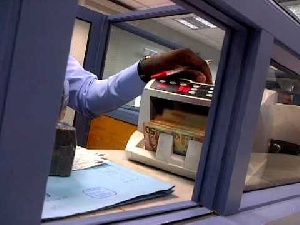Out of 25 Sub-Saharan African currencies captured by Ecobank Research, the Ghana cedi is the 7th worst performing currency in Africa despite the relative stability against the dollar in the first quarter of this year.
The local currency had depreciated by 0.9 per cent against the US dollar as at May 23, 2016, an improvement against about 20 percent loss experienced during the same period last year.
The Zambian kwacha which was competing against the cedi last year as the worst performing currency on the African continent is rather African’s best performing currency this year, appreciating by about 7.8 percent against the dollar, the world’s most important currency.
Following in 2nd, 3rd, 4th and 5th positions were Guinea CFA, Sierra Leone, Leone, Ivory Coast CFA and Cape Verde’s escudo respectively. They had all appreciated against the US dollar by 5.8, 5.4, 4.2 and 3.7 percent respectively.
Nigeria, which has been battling with low oil prices, saw its naira remaining unchanged against America’s green currency as at May 23, 2016.
While South Africa’s rand lost 0.5 percent in value against the US dollar, the Kenyan shilling appreciated by 1.4 per cent.
At the 25th position is the Angolan kwanza whose economy has been battling with decreased oil receipts due to low oil prices. It has so far lost 20.1 percent in value against the dollar.
Mozambique metical and The Gambian dalasi which was Africa’s best performing currency last year placed 24th and 23rd respectively, depreciated by 13.1 and 7.8 percent respectively to the dollar.
The Bank of Ghana (BoG) revealed in its recent assessment of the Ghanaian economy that the current stability in the local currency continued on the back of tight policy stance and improved inflows.
On the outlook, Ecobank Research said the cedi will weaken against the dollar due to strong US dollar demand to meet import bills, US debt servicing costs and large/unsustainable fiscal and current account deficits.
It added that “IMF advised reforms and continued tight policy stance by the Bank of Ghana will, however, help build confidence but inflation amid weak 2015/2016 cocoa output and higher spending in the run-up to this year’s elections all raise concerns.”
The local currency is expected to hover around GH¢3.878 against the American currency this week.
On the global market, the renowned research body said the US dollar will strengthen as rates go up, explaining that any rates hikes this year are unlikely to be aggressive.
“We expect volatility in foreign exchange and capital markets to rise,” it added.
The Ghana cedi registered a marginal 7 pesewas loss in value against the American currency, about 0.48 percent depreciation for the first quarter of 2016.
It, however, lost about 60 pesewas in value to the US dollar last year. It started the year at GH¢ 3.2001 to the American currency but ended the year at about GH¢3.80, about 15.0 percent depreciation rate.
Business News of Thursday, 2 June 2016
Source: The Finder

















